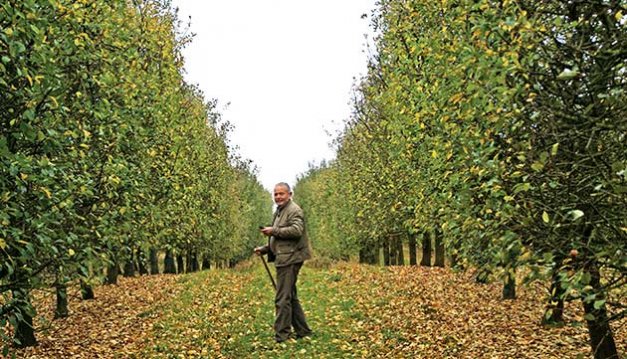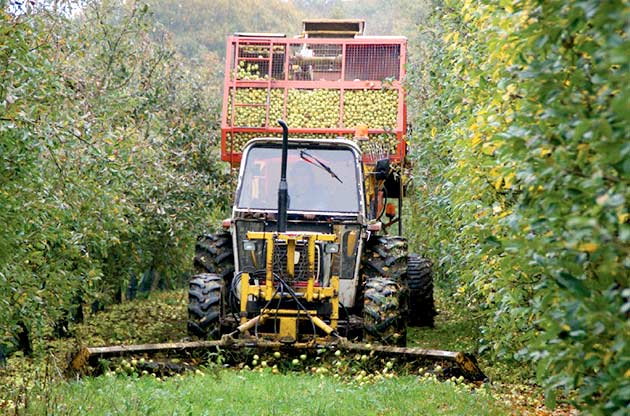
Cider apples in France are grown on tall, vigorous trees, and apples are picked up by machine from the ground in the fall. This is Maurice Levier, Le Perche, who makes Calvados brandy from hard cider. (PHOTO AT BOTTOM) The apples drop or are dropped to the ground and swept up, much as nuts are harvested in the United States, but with more grass and leaves. (Courtesy Tim Dressel)
At least a dozen orchardists along the Hudson River from New York City north to Albany are developing cideries—the apple cider equivalent of grape wineries.
They’ve developed the Hudson Valley Cider Alliance, are putting together a hard cider trail, and in the fall they celebrate Cider Week. It’s October 18-27 this year.
Helping to make all this possible is Colette Rossant, a woman born in Paris in 1932 and raised in Egypt during World War II. In 1955, she married American architect James Rossant, and they established residences in both New York and in the Normandy area of France known for its hard apple cider.
Colette Rossant, who enjoyed a long career as a French teacher, writer, journalist, and restaurateur, is still writing cookbooks and now lives in France.
Some years ago, she saw that apple orchardists in the Hudson Valley were going out of business, selling their land to developers, while orchardists in France seemed to be doing very well, and she thought it had a lot to do with better utilization and increased value of apples through hard cider.
Two years ago, she took her idea to Glynwood, a nonprofit organization in Cold Spring, New York, founded in 1929 to foster rural conservation—that is, preserving farming in the Hudson River Valley.
At Glynwood, vice president of programming Sara Grady was put in charge of The Apple Project, the stated goal of which is to “preserve apple orchards in the Hudson Valley by promoting the production of hard cider and apple spirits.”
Cooperation
Three parts of the program now are creating the Hudson Valley Cider Route; sponsoring Cider Week, during which 200 restaurants, bars, and shops will feature hard cider; and—most interesting of all—sponsoring an Apple Exchange.
The exchange took place in 2011. Rossant organized the French side of things, bringing together orchardist cider makers from Le Perche, France, who came to the Hudson Valley to see how the Americans handled things, especially direct farm marketing.
Nine orchardists, cider makers, and distillers from New York traveled to France to see how they made and sold hard cider.
“The American side of the exchange was funded by Glynwood, and the French side was funded by our Percheron partners,” Sara Grady said. Glynwood is a nonprofit organization that raises money from philanthropists, foundations, and some grants.
Tim Dressel was among the representatives from eight Hudson Valley cideries who took part in the exchange.
“It was definitely a once-in-a-lifetime opportunity,” he said. “Unfortunately, I was still in the very early stages of my new business and hadn’t produced anything yet, so I couldn’t relate to some of the things we were learning as well as the other producers.
“It did expose me to their style of hard cider, which is different from what we’re used to in the States. It’s lower alcohol, usually unfiltered, very highly carbonated, and usually has a much more yeasty, farmhouse kind of style to it. We all loved it and drank a ton of it, although we all agreed that the American palate probably isn’t ready for something like that. They’re much more in line with tradition with their production techniques over there, to the point it’s restrictive to the producers and sometimes prevents them from innovating.”
Also taking part in the exchange were:
• Joel Elder from Tuthilltown Spirits, Gardiner, New York. This craft distillery produces the Hudson line of whiskies and vodka made from apples (called Heart of the Hudson and Spirit of the Hudson).
• Jason Grizzanti from Warwick Valley Winery, Warwick, New York. They produce Doc’s Draft Cider, American Fruits Apple Brandy, and Bourbon Barrel-Aged Apple Liqueur as well has having a pick-your-own orchard with retail store and café.
• Derek Grout from Harvest Spirits and Golden Harvest Orchard, Valatie, New York. The distillery produces Core Vodka and Cornelius Applejack and has other products in development. It also has a pick-your-own orchard and a cider mill.
• Jeff Soons from Soons Orchard, New Hampton, New York. Jeff is starting to make hard cider and is a partner in Orchard Hill Cider Mill making pommeau, a mixture of apple brandy and apple juice. The operation is an orchard and vegetable farm, with a pick-your-own orchard, a cider mill, and a farm store.
• Dan Wilson at Slyboro Ciderhouse, Granville, New York. The cidery makes a line of still, sparkling, and ice ciders. It’s also New York State’s oldest you-pick orchard and has a cider mill.
• Elizabeth Ryan at Breezy Hill and Stone Ridge Orchards, Staatsburg and Stone Ridge, New York. Elizabeth once produced hard cider (as Hudson Valley Cider Company), and she is reviving that this year in collaboration with a winemaker. Fruit grown at two orchard sites is sold at Greenmarket in New York City, as well as through CSAs, regional farmers markets, and other outlets. The farm offers you-pick and operates a cider mill, as well as selling other products.
• Doug and Adam Fincke at Montgomery Place Orchard and Annandale Cidery, Annandale-on-Hudson, New York. The orchard is on a historic site, with a micro-cidery. The orchard grows the largest variety of heirloom cider apples in the Hudson Valley region. A nearby farm stand sells fruit, vegetables, honey, and the hard cider produced by the farm.
In an article she wrote, Grady said, “Let’s put a spirited spin on that old slogan, and drink an apple a day—to keep away the suburbanization of the Hudson Valley and the extinction of our original elixirs.
“With the Hudson Valley existing at the forefront of the local food movement, apples can become our emblem of a vibrant culture of regional food and drink. So, let’s raise a glass of hard cider to toast apple biodiversity, orchardists’ livelihoods, a future of fine local brandies, and, of course, our own homegrown spirit.”


Leave A Comment